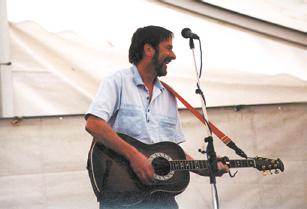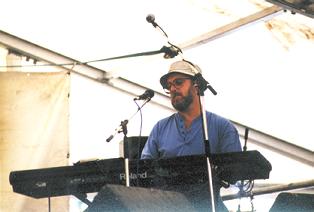| Kenny
Craddock Interview |
| Monday
13th October 1997 |
| by
Chris Groom, pictures by Julia Revell |
| The branches of the Lindisfarne 'family tree' stretch far
outside the original "feisty five", yet one name that crops up time and again is that of
Kenny Craddock - Hammond organ, piano, keyboards, guitar, accordian, vocals,
songwriter, producer - you name it, Kenny's been there, done it and not only brought the T-shirt, he probably designed and printed it too. And it's not only Lindisfarne afficianado's who should recognise his name - Ken has recorded and performed with such luminaries as Paul Brady, Ginger Baker and Van Morrison, while his piano playing features on a top five hit single alongside Ringo, George and Eric but more of that later. I'll start with Kenny's roots in the North East and try to keep my questions and prompts to a
minimum |
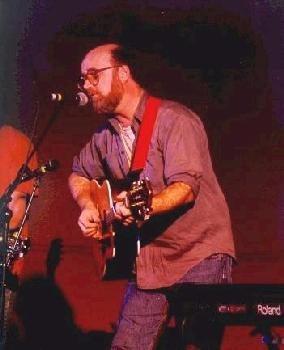 |
CG - Your connections with Lindisfarne obviously go back a long way, in fact Ray Laidlaw has suggested that he helped you to find your first non-musical job
KC - Yes, I have had two jobs in my entire life outside of playing music. One of them was at Maxi Shares in Newcastle which was a music shop that I worked in when I was fifteen, after I dropped out of school. This was after I had decided that I wanted to play music for a living, much to the horror of my parents, and so I worked there for a while. Then I went down to London to record a single with the group that I was playing with in Newcastle at the time, called The Elcorts and when I came back I found myself on the dole, or what was considered to be the dole at that time, as I was still very young, only about sixteen and I just had to get myself a job.
I eventually got a job at Shepherds department store in Gateshead - I don't know why they ever employed me - I think I was there for about six months, and Ray Laidlaw was working there too. That was the first time we met, but once we got to know each other he would cover for me if I had a gig; Ray was gigging with another band at that time and I think I used to occasionally cover for him, but more often that not he had to cover for me. If we had been playing in a hall in Darlington or somewhere and got in real late, slept in the van, Ray would get in a bit early to cover until I could drag myself in! We used to hang out together at lunchtimes to talk about what we were doing, bands, gigs, records, you know - this would have been around 1966, so I guess Ray was playing with the Downtown Faction?
As I say, the Elcorts were the band that I recorded the single with in London, in fact at Abbey Road studios and it was number one in the Newcastle charts for ages. It was a version of 'Tammy' which had been a hit for Debbie Reynolds in the 'fifties and backed with 'Searchin'
(it was on Parlophone R5447 for all you record collecting
fanatics). It was a really strange time, remember I was only fifteen and we'd be up on stage with all these young girls screaming at us and trying to tear our clothes off! (I don't think they would be quite so interested now). The Elcorts were really quite a good little group, our drummer Paul Nichols went on to play in Lindisfarne Mk II and later into the band Widowmaker. The next band that I joined around 1966 was The New Religion - it wasn't my name, I hasten to add - we had a good guitarist called Don Whittaker and it was a
much 'bluesier' sort of thing that was very good for a while; the band
lasted about a year.
CG - Was there a definite meeting place for all the young
musicians in Newcastle - a regular gig, or a music shop maybe?
KC - Well, for me it certainly wasn't a pub gig because I was still too young! But yes, the musicians would meet in the music shops and at gigs like the Quay Club and the Club A-Go-Go, which ran a subsiduary club called the Young Set. I gleaned so much musical information from the 'Go-Go', as I'm sure did most other musicians. I would go along to the Young Set, which had no age restrictions and then if you knew the guy on the door to what was known as the Jazz Lounge, which was for the over 18's, then you could often sneak in there too!
I can remember seeing Graham Bond play there, that old Hammond organ of his was set up on the stage and I went up and leant on it right at the beginning of the night - they weren't on for another hour and a half, but I got in early because I wanted to watch everything he did, every note that he played. Then of course, years later I actually got to work with Graham in Ginger Baker's Airforce, but this time I was playing the Hammond organ and he was playing saxophone!
CG - It seems strange today, almost a cliché, that a Newcastle group needed to travel down to London to record their first single, but was that generally the case?
KC - In our case it was directly linked to the fact that we managed to get a deal with EMI; we had a manager, Derek somebody or other who was basically trying to be Brian Epstein and he managed to swing this deal with Parlophone Records and it was they who booked the studio time at Abbey Road. There was also the element of being exposed to a London audience, we played a lot of the London clubs while we were down there, some really posh places where all the pop stars of the day would come in to relax. And we'd stand there open mouthed like a lot of kids standing on the corner pointing and staring, which of course we were, you know just little lads from Newcastle. But it was all important exposure, we were trying to make it nationally, and not just in the North East.
I left Newcastle when I was seventeen, and moved down to London along with Alan White who, and I'm sure Ray will agree with me, is a phenomenal drummer, not flash but very solid with a lot of flair - and most people know him for his work with Yes. We both joined up with Peter Kirtley, who later worked with Alan Hull on a couple of albums. So I have lived away from the North East ever since then, apart from the period when I joined Lindisfarne Mk II and lived in Jesmond for about six months, before the band folded and I moved south again.
[ That band with Alan White, Peter Kirtley and Alan
Marshall on vocals actually released two singles as HAPPY MAGAZINE.
1.Satisfied Street/Do Right Woman, Do Right Man (Polydor 56233) 1968 2.Who Belongs To You/Beautiful Land (Polydor 56307) 1969.
Alan Price managed the band, was also their producer and wrote Satisfied Street.
R.Groll ]
CG - But you were involved with other Newcastle bands like Bell & Arc?
KC - Hmmm, well I was never actually a member of Bell & Arc, but I used to play on a lot of peoples albums, I was always the other member when they needed someone to play some Hammond or add a bit of piano. Just after Bell & Arc, Graham Bell made an album with Bob Johnston, who produced Fog On The Tyne' and I was drafted in for to play all the keyboards, although I believe they later got an American player to play on the final album, there were all sorts of strange politics going on at the time. So although I wasn't directly involved with bands like Arc or Skip Bifferty, I knew all the musicians and we would hang out together - for a while there was this sort of Geordie 'mafia' living down in South London. Which was nice, it was very comforting to meet up with all these people that you used to know from Newcastle.
|
I joined Ginger Baker's Airforce sometime around 1970 and stayed with them for about a year and a half, and again it was just great experience. As I mentioned earlier, it meant that I got to play alongside Graham Bond who, when I was very young, had been one of my heroes, I just loved |
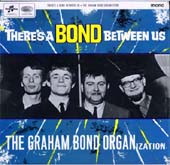
|
everything that he did.Ginger had been playing with the Graham Bond Organisation and when he came to put together his own band, he didn't think it would be right for Graham to play Hammond organ or it would still look like Graham Bond's band - at least that is how I read the situation. |
I basically took over from Stevie Winwood, who was with Airforce when it was initially a one-off thing and then the 'stars' were shooting off in all sorts of directions. A few of them stayed; Denny Laine, the late Harold McNair who was a fantastic saxophonist, Phil Seaman, the late Phil Seaman, there's quite a few dead ones in there, unfortunately the bassist who used to be with Family - Rick Grech. So there were quite a few star players, who were all used to this rock'n'roll lifestyle, fending off the press and so forth, whereas the strangest thing I had to get used to was buying expensive hip clothes!
But it was wonderful experience and Graham was just this huge reservoir of musical knowledge and he kind of adopted myself and Colin Gibson - Colin joined to replace Rick
Grech on bass - and the three of us would go drinking and generally hang out together. These were some heavy people to be around when you're just twenty, you had to have your act together, one way or another. Ginger was wonderful; I mean he was, and everybody knows about it, he was a junkie although I'm pleased to say that he isn't anymore. In those days, to try and kick the habit, he would just take off to Nigeria and play with these African drummers in the middle of the jungle - and shortly afterwards he built a studio out there. As soon as he came back we would start rehearsing for a tour, and Ginger would actually be quite shy - he might still smoke a bit of dope but at least he would be off the smack - whereas before he left he could be quite 'worrying', to say the least! Pretty dangerous, I mean, I never got any of his wrath, but some guys did. He was a heavy man, but very loveable and if you were in a spot he would do anything to help you out.
He would think nothing of running you home, North London to Bromley at anytime of the day or night, at seventy miles an hour in his Jensen. He loved driving and in fact he was a very good driver, so the speed never seemed a problem. I remember we got stopped one night and we'd only been doing sixty which was quite slow for Ginger - this cop pulled us over and asked Ginger if he knew he was driving over the speed limit - and Ginger said "Speed limit? I can't get out of fucking first gear in this thing" He was looking pretty wild at the time in his big African hat and 1970's hippy fashion and when this poor copper bottled out, we just tore off down the road.
CG - I understand that you played on a session with George Harrison and Ringo Starr?
KC - I did, yes. At that time I was playing in a band called Griffin with Graham Bell, Alan White, Colin Gibson and Pete Kirtley which was potentially capable of doing some good business, but there were some very evil politics going on, connected with the music biz Al Capone of the day. We had a single out at the time which was just starting to take off and he basically put the frighteners on the record company executive and forced him to pull the plug on our record. Physically threatened him, basically. This was around 1969 and the band were all living in a big house in Wembley. We would go into town for a drink in the Ship in Wardour Street which was close to the record company offices and then on to the Speakeasy, this was our regular night out.
One night we met this guy called Terry Doran who was George Harrisons man, his assistant or roadie, whatever you like to call him, he'd been with the Beatles from very early on and he became a good friend of ours. He took us out to George's house, when George wasn't around, and we were all marvelling at this fantastic place, plus George also owned the very first Moog synthesiser in this country, which I managed to get to work. Terry would get us the odd gig or session and when he asked me if I wanted to play on one of George and Ringo's, I said yeah, a bit nervous, but I'll do it. So I got the gig and it turned out to be playing piano on the single 'It Don't Come Easy', which I think ended up around number four in the charts in April 1971. I got a hundred pounds for it, which was about three times the normal session rate in those days, so I was quite happy Then I was picked to work on some Indian film music that George was involved with - George, Ringo, Eric Clapton, Klaus Voorman and myself were in the band, the same band that played on the single, we were the nucleus of the theme with orchestration over the top. Ken Scott was producing, or co-producing it at Trident studios.
About a year later, I was also asked to play on Georges album 'All Things Must Pass', but I was incredibly ill just before the sessions. Myself and Bud Beadle had gone down to Haling Island, after an all-night session with Ginger Baker's Airforce and fallen asleep on the beach! I woke up about noon after the sun had been beating down on us, with very, very severe sunstroke and I was ill for about four or five days. I had to phone in sick for the session - it was probably the worst bit of bad timing in my entire life - I'd been booked for to play on the whole album and they had to get someone else in to do it, Nicky Hopkins I think. But they were great people to work for, as you would imagine, all very nice guys, very easy to get along with.
CG - Presumably that quality of session work came as a direct consequence of living and working around London?
KC - It was absolutely essential for anyone who was really going for it, to come down to London at some stage. Most of the guys from Lindisfarne lived in London for a while; Si lived there for a long, long time, Alan moved down, he lived in Barnet for a time. I stayed with them on numerous occasions, the whole family came down and I would take the girls to the shops on Saturday mornings for to buy them sweets; they would come and get me out of bed because they knew they couldn't get Alan up at that time in the morning!
I've missed a period out, because just after Airforce a whole bunch of us went to live in Suffolk to study music and generally check things out. There were seven of us in this band called Simpson's Pure Oxygen (a Colin Gibson idea) and we did two gigs, which were both in Newcastle; but that wasn't a problem because we'd lived and played together for nearly a year and we had nearly all made enough money before that to sustain us during that period. If money ran short there was always someone nipping into London to do a quick session and any money went into the communal pot. Somebody out there may remember us - let's see, we played at 'Change Is', which I think was a club run by Bob Monkhouse of all people, and at The Corner House in Heaton and both gigs were packed, we went down a storm. It was a great band; three horns, piano, two guitars, Colin on bass and Alan White again, on drums.
Anyway, Colin Gibson and myself went off to the States with the Marc/Almond Band - Jon Marc and Johnny Almond, Danny Richmond on drums, this was another great learning period - and meanwhile Alan White, or 'Whitey' as we called him, he joined Yes and became very rich, very quickly. He bought a big house and a couple of Bentley's and we were all incredibly jealous! Pretty soon he was in a position to record a solo album, thanks to his success with Yes and to help him record it we basically put Simpson's Pure Oxygen back together plus a few other session players. It sold very well, in fact as far as royalties go I'm still getting the odd trickle from it now, I think it's just been re-released in Japan
CG - Everyone's back catalogue seems to be coming out on CD, I guess there are a lot of musicians out there now receiving unexpected cheques in the post?
KC - Yes, although I think my last one came to about fifty one quid, or something like that. As my friend Barry Dransfield says whenever he gets an envelope from the PRS, "I suppose there's a Chinese dinner in there"! - but yes, there are the occasional nice surprises; the PPL and Pamra are now paying session players from old recordings, which I think is a well overdue bonus.
The Marc/Almond thing was amazing, we did an album, a three month tour of the States supporting Joe Cocker, and we finished the tour in Hawaii, which was all very nice - except that I had an accident. I must have had one too many to drink at the end of tour party, I went into the wrong hotel, fell down some stairs and dislocated my shoulder. I was taken to hospital and plastered up but I felt fine, nothing broken. When Jon Marc came in, I thought he was coming to check on how I was and if I could continue with the next part of the tour, the Joe Cocker part had finished and this was due to be our own tour of the U.S. college circuit. I cheerily waved my good arm at him and said I'll probably be alright for the rest of the tour, whereupon he held up his left hand to reveal the hand minus one finger!
Apparently Jon had climbed up a palm tree on Waikiki beach and his wedding ring had caught in a ring of lights near the top of the tree; he fell onto the beach and the people who were with him climbed back up the tree and found the wedding ring with his finger still in it! So we were in Hawaii for a month while Jon underwent this extraordinary treatment whereby they made an opening in his chest and inserted what was left of his finger in order to keep the tissues alive and avoid the dreaded gangrene (nice eh?). So we spent an enjoyable month, Colin and I ended up doing interviews on radio shows all over the island and we did eventually manage to play about a months worth of college dates in the States by changing everything to open guitar tunings - Jon could just about manage that, minus a finger.
All of the Marc/Almond band's success, well nine tenths of their success was in the States; both of them had played with John Mayall at some point, so they had this grounding in the blues and they were this bluesy, folky, jazz orientated combination, that was just wonderful to play with. Danny Richmond was the meanest guy to work with, he was considerably senior than the rest of us but a wonderful man and another phenomenal drummer I mean Charles Mingus asked Richmond to play drums for him, when he was actually his saxophonist at the time. Mingus told him "I want you to play drums on my next album" which turned out to be 'Tijuana Moon' and it was a "but I don't play drums well you do now" - sort of thing!
CG - A lot of Lindisfarne fans first got to know you from your work on Alan's 'Pipedream' album - how did that come about?
KC - From the moment I first met Hully, we had this love/hate relationship; I was full of admiration for him, but he wasn't quite sure about me because I was a bit of a 'player'. I had my chops together pretty early and I could play a bit of jazz - not terribly well, but I was doing it - and he wasn't terribly enamoured with that style of music. We had bumped into each other at various gigs, I'd see him at the Quay Club or wherever and I knew he had been to check out my playing. Then I ran into him again in London, at the offices of Tony Stratton-Smith, Charisma Records - I was there to sort out the details for a Graham Bell session. We wandered out together and decided to do some shopping; Alan was looking to buy a sort of airman's jacket, with the big fur-lined collar and I was after a pair of binoculars, for some strange reason! So we decided to walk down the Strand to a shop where I knew they sold both of these things; we bought our purchases and Alan said "do you fancy a pint?" Well after several pints we realised that we were both listening to the same sort of music, reading the same sort of books and we became pretty close from then on in. That 'one pint' we were supposed to have, lasted almost the entire day!
That would have been about 1971/72 and we would bump into each other and regularly kept in touch from then on.
When the sessions for 'Pipedream' came around, I think I just got a call asking if I would like to play on the album - and I was more than happy to do it. Whenever I was in Newcastle I would drop by to see him and Pat, I became good friends with their family and we basically became soulmates; so when the chance to play on his album came about it was just a wonderful experience. We only rehearsed for a day, maybe two at the most and then recorded the whole thing in about a week. We were all much younger then and very keen, and everyone on that album just wanted it to be so good, you know?
I believe that the line-up which eventually became Lindisfarne Mk II were originally going to be called the Pipedream Band or Alan Hull's Pipedream Band, but the powers that were at the time pretty much insisted that he and Ray Jackson keep the name Lindisfarne.
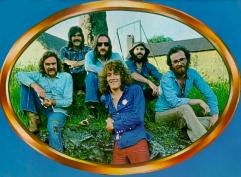 Apart from Alan and Jacka, I think possibly I was the only other player from the Pipedream album to go out on the road with the Mk II line-up. We added Charlie Harcourt, Tommy Duffy and Paul Nichols, from the Elcorts on drums.
Whereas of course, Ray Laidlaw had played drums on Pipedream before going off on the road with Jack the Lad - and Colin Gibson played bass on the album, but didn't join us on tour. We drafted these people into the touring band and they all turned out to be Geordies, strangely enough; but I remember Hully telling me that he originally offered the drummers job in Lindisfarne Mk II to Phil Collins, and he might well have taken it at the time because he and Genesis weren't quite so well known then - and certainly not doing the sort of business they are now. And when he turned the job down, Alan told Phil: "You'll regret this decision for the rest of your life" - very prophetic Alan!!
Apart from Alan and Jacka, I think possibly I was the only other player from the Pipedream album to go out on the road with the Mk II line-up. We added Charlie Harcourt, Tommy Duffy and Paul Nichols, from the Elcorts on drums.
Whereas of course, Ray Laidlaw had played drums on Pipedream before going off on the road with Jack the Lad - and Colin Gibson played bass on the album, but didn't join us on tour. We drafted these people into the touring band and they all turned out to be Geordies, strangely enough; but I remember Hully telling me that he originally offered the drummers job in Lindisfarne Mk II to Phil Collins, and he might well have taken it at the time because he and Genesis weren't quite so well known then - and certainly not doing the sort of business they are now. And when he turned the job down, Alan told Phil: "You'll regret this decision for the rest of your life" - very prophetic Alan!!
That was a good period, it was a different type of band to the first line-up that had been so popular and we certainly didn't even try to achieve that distinctive 'Lindisfarne sound' that the original band had.
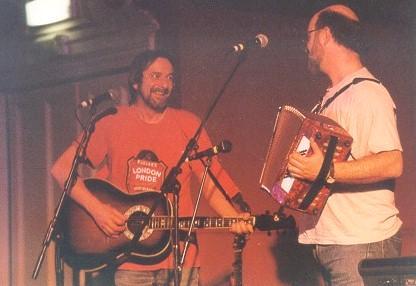
CG - When you listen to the Mk II albums, 'Roll On Ruby' and 'Happy Daze', they sound much harder and more rock'n'roll orientated, with far less of the folk influence of the earlier band
KC - Well that's right, that was kind of the intention; it wasn't that Alan and Jacka particularly wanted to get away from that, but they did want a change of direction and with the mixture of new musicians in the band, that's the way it turned out. Some of the things we tried didn't really work out and normally those things would have been ironed out in rehearsal or dropped before we went out on the road, or whatever; the trouble was that we were in a position where Lindisfarne already had a tour lined up, with people booking tickets for to see them, so we just went straight out with what we already had.
CG - Bearing in mind the break up of the original band and the new sound, what was the audience reaction?
KC - It was very good at the gigs - in the music press it was abysmal, they tore the arse out it - but the gigs were all packed houses, the public reception was great. We were still playing all the 'hits', from the original band, and omitting certain old songs that simply wouldn't have worked with the new group. We were obviously playing songs from the new album and towards the end of the tour we were bringing in some of Alan's older material but reworking it to suit our style.
Funnily enough it worked really well in America, where the band could actually play without the audience having the preconception of how 'Lindisfarne' should sound, so we got to play exactly how we wanted and without too many critics hanging around. We toured the States for about six weeks and to say that we really took off there
would be a bit of a sweeping statement, but we had some great nights and got to play with some good bands, on the same bill with people like Little Feat and Traffic. All of the Geordie stuff went by the board of course, they just didn't understand it, but by the end of the tour Alan had written some new material for the next album and the band were pretty tight - you had to be, playing support to the likes of Little Feat. It raises your sights just a bit!
So it was a bit of a shame when we broke up after that tour, you know? but it was probably the right time; we could have gone on to do a third album, but it had all become a committee thing Mind you, we had a good time recording and everything, working with Eddie Offard who had recorded most of Yes's albums with Alan White and we went up and recorded at Trevor Moraz's place. Everyone was putting songs forward, including one or two that I had, and a lot of the songs on that album (Happy Daze) were recorded outside, which as great. Songs like 'River', you know, with two of us playing acoustic guitar, Jacka playing mandolin and the sounds of birds and the little babbling brook were just recorded live - it all added to the 'ambience' of the recording.
CG - What did you do after the Mark II band split up?
KC - I briefly formed a band with Tommy Duffy, Graham Bell and a couple of other musicians, called Stotts - which is a geordie name for 'balls' - I can't remember why, it's probably something to do with Stottie cake! That didn't last very long. Then it was off to more session work including an album with Alan White, who by then was in a very strong position with Yes, all the members were doing their solo albums.
After 'Pipedream', Kenny remained an essential ingredient in the recording of Alan's solo work, playing on 'Squire' in 1976 and on 'Phantoms' in 1979. Incidentally, when Squire is eventually re-released on CD, let's hope they keep Tom Pickards wonderfully surreal sleeve notes "put Alan down Kenny, we know he's skinny with a pointy beak, but he'll never stick in the board!" for example. Between the two, Alan put together a band called Radiator with Kenny, Pete Kirtley, Colin Gibson, Terry Popple and Ray Laidlaw. They recorded one album and a single both called 'Isn't It Strange' (1977) and some later recordings which became 'Phantoms'.
CG - You also got to work extensively with Van Morrison, tell us how that came about?
KC - Oh, I got another phone call! but this was considerably later. I had been working with Gerry Rafferty for a while, around 1980, out on tour with him and on a couple of albums, while Van Morrison had been working with Hugh Murphy on some songs (Hugh was Gerry's co-producer). Van was looking for a keyboard player and dear Hugh, who incidentally is not very well at all at the moment, kindly put my name forward and I was given an interview. Not an audition, mind, an interview and I didn't know
what the hell was happening. I got this call from Paul Charles who spoke to me about what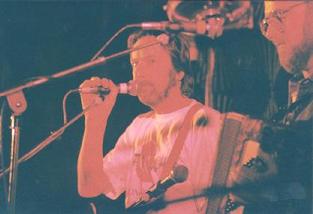 I'd been doing and would I go down and meet Van - I was still expecting an audition but he just wanted to chat to me! I spent a couple of hours down at Van's house, chewing the fat about this and that and the next day I called Paul Charles and said "Look, what's happening, am I in the band or when do I go for the audition.." but he told me, no you've got the gig, the rehearsals start this afternoon! In fact we only rehearsed for about two and a half hours and then two or three days later we were touring Europe!
I'd been doing and would I go down and meet Van - I was still expecting an audition but he just wanted to chat to me! I spent a couple of hours down at Van's house, chewing the fat about this and that and the next day I called Paul Charles and said "Look, what's happening, am I in the band or when do I go for the audition.." but he told me, no you've got the gig, the rehearsals start this afternoon! In fact we only rehearsed for about two and a half hours and then two or three days later we were touring Europe!
After about eight or nine months working with Van, I became his musical director, because the American contingent were not able to come across for reasons that were probably financial and so we formed an Anglo-Irish band which was a slightly smaller and I became the band leader, playing Hammond organ and piano and that carried on for another two years. I also got Terry Popple the job of drummer with Van.
CG - He is supposed to be a tricky guy to work with, isn't he..?
KC - No, no, not at all print this! Yes, of course he is, I mean every journalist asks every musician who has ever played with him the same question. He's not the easiest guy in the world to get along with and Van would be the first to admit it. In fact, in one of his interviews a couple of years back he told the reporter "look, I didn't say I was going to be a nice fucking guy" you know? But he is a nice man, he's a very intense man and that intensity is what a lot of people, myself included, love about his music. I like the fact that he's not precious about his music, he'll record an album in a few days and just put it out, warts and all.
The guy I took over from was an American called Pee Wee Ellis, who had also been the saxophonist and M.D. for James Brown. He would stand next to me and use all these hand signals to tell the band where to go next, or at least where he thought Van was going to go next. He would say things to me like "lose the third, man, lose the third", because he knew the trumpet player was playing or about to play that note, and he didn't want it in the chord! It was total concentration on everything that was being played around him. It was probably helped by the openness that you had in Van's band, it wasn't busy, you played only where you needed to, and there were often moments where there were just layers, little backdrops over which Van would spin his narratives or scat or whatever. Playing under an M.D. of the calibre of Pee Wee was a tremendous learning experience and something that I was able to do when I took over the job later on - to concentrate on what Van was doing and instruct the band accordingly. You really needed to be able to read his mood, to read his performance.
Van gets through a lot of musicians, when he feels it's time for a change there is often a wholesale clearout and a complete new band. I finished playing with Van around 1985, although since then he has actually recorded one of my songs, which was wonderful. While I was working with him I put a few things forward, including a couple of William Butler Yeats poems and in particular I wrote this tune around a piece called 'Before The World Was Made'. I played it to him after a gig one day and he said that he would really like to record it one day - and I just forgot about it for a few years, until I was producing Lindisfarne's 'Elvis Lives On The Moon' album and I got a call from his solicitor asking if I would allow him to record the song - I said it's absolutely out of the question!! So he went ahead and recorded it which was great, it's kept the wolves away from the door on a number of occasions. But Van is not the sort of guy who keeps in touch with people, I've sent him the odd card over the years and bumped into him on a couple of occasions Hi, Ho.
About a year ago I was playing with Paul Brady on the Jools Holland TV programme and Van was also performing on the same show, which was great. I worked with Paul Brady for quite a while, in fact for some of the time I was with Van, which became complicated especially as Paul Charles was instrumental in handling both sets of tours. I think there was only one night when I had to get someone to dep. for me and I managed to get Tim Hinkley to stand in.
When I was touring in Europe with Van, Paul Brady came backstage at a gig in Paris and asked if I would consider working with him, which I happily accepted - playing keyboards. I also got to work with Maura O'Connell, I became her musical director around that same period; it was an extremely busy time for me and I took on all this work, not out of greed but I was hungry for the knowledge more than anything else. So this Irish connection became strong through working for Van Morrison really, I've spent a lot of time working and touring extensively in Ireland. There was a wonderful guitarist in Van's band called Arty McGlyn, who is still a very dear friend of mine and we meet up on a regular basis - Arty has played with De Dannan, Planxty and with a fine songwriter called Mick Hanly, who was in Moving Hearts replacing Christy Moore. So I took the Hammond organ to their music scene in a sense, because although I play a lot of instruments, the Hammond is really what I'm known for - and what I'm hired for more than anything else.
CG - Touring with a Hammond must be awkward to say the least, it is not the world's most moveable instrument?
KC - So they tell me! Yes, I mean I've got a very portable one now, you can't quite stick it under your arm but it sounds great - it's what I used on the last Lindisfarne tour that I did, promoting the 'Elvis' album. But if you take a C3 or a B3 Hammond, I used a B3 with Van Morrison, then sure they're both substantial pieces of furniture!
CG - As you've mentioned, you teamed up with Lindisfarne again in 1994 to produce the studio album 'Elvis Lives On The Moon' and toured with the band to promote it.
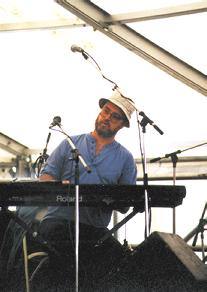 KC - Alan and I hadn't worked together for some time, which was cool, you know, we all have absences and I knew that we would get back together at some point. The band went over to play in Russia and about two weeks after they got back Alan called me up and said "I've written this lyric" He couldn't wait to tell me all about his experiences over there, he loved it - apart from the fact that he couldn't get a drink on the aeroplane! - and he said to me "I've written this lyric, but the tune I've got for it is crap." So he sent me the lyric, this was 'Mother Russia' by the way, and I wrote a new tune for it, made a new demo of it with my vocal, sent it back within a couple of days and he loved it. Alan came down to my place and put his vocal on to a new demo and the collaboration went on from there, another new start in our ongoing friendship. I ended up co-writing three songs on the album, 'Demons', 'Mother Russia' and 'Spoken Like A Man'.
KC - Alan and I hadn't worked together for some time, which was cool, you know, we all have absences and I knew that we would get back together at some point. The band went over to play in Russia and about two weeks after they got back Alan called me up and said "I've written this lyric" He couldn't wait to tell me all about his experiences over there, he loved it - apart from the fact that he couldn't get a drink on the aeroplane! - and he said to me "I've written this lyric, but the tune I've got for it is crap." So he sent me the lyric, this was 'Mother Russia' by the way, and I wrote a new tune for it, made a new demo of it with my vocal, sent it back within a couple of days and he loved it. Alan came down to my place and put his vocal on to a new demo and the collaboration went on from there, another new start in our ongoing friendship. I ended up co-writing three songs on the album, 'Demons', 'Mother Russia' and 'Spoken Like A Man'.
When I was asked to produce the album I was in a quandry about how best to approach it - I knew everyone socially but hadn't worked with them as a band for some time. In the end I called a meeting in a pub, which turned out to be a good move - it gave everyone the chance to put forward their ideas and misgivings about the songs and arrangements - everything was brought out in the open before we actually went into the studio, plus we all had a really good drinking session. Needless to say we didn't go straight into the studio the next day!
Well, having produced and played on the album, when it was time to take it on the road I went with them to play hammond, piano and guitar. It was also around this time that Simon Cowe decided to disappear off to Canada - he played on the album, but just before the tour he went over to Canada to set up his brewery - so his vocal would have been missing from their wonderful choruses and so I helped out there too (I think!?).
Once the tour finished, Alan decided to keep the momentum going and we went off on an acoustic tour with Miller Anderson - this was the tour that produced the 'Back To Basics' album, which was recorded live at the shows in Blackheath and at the Mean Fiddler.
For the six years before he died I collaborated with Alan on a large number of songs, we worked together pretty closely on a various projects, but mainly 'big ballad' style songs specifically written for other artists to record. In one instance, we weren't exactly commissioned but we wrote a song for the film 'The Bodyguard', starring Whitney Houston. It was a fantastic song, everybody who heard it said the same - we got a glorious singer, Lianne Carroll to sing it for us on the demo. People were pitching from all over the place, because of the enormous amount of money involved, there would be an almost guaranteed hit single, the film soundtrack itself, a soundtrack album and after they whittled all these songs down to a shortlist of about six, we were still in there! At the last minute, Kevin Costner said, well I like this Dolly Parton song, I think this would be right - and so they went with 'I Will Always Love You', which is a great song and a fine performance. But Whitney had actually heard and liked our song, which was called 'Always It's You'.
CG - This is a side to Alan that I'm sure will come as a big surprise to a lot of people. We know him to be a great songwriter, but most of his writing is so personal - it's hard to imagine him writing with another singer in mind
KC - Yes, I know. As far as his songwriting goes, I'm sure most people think of him as working very quickly - putting pen to paper, strum a few chords and then nip of down the pub. Well, we certainly spent some time in the pub, but there were whole days when we would work through lyrics and arrangements very fastidiously, Alan would come down and work in my studio and he really put the hours in whenever it was necessary. He had the career with Lindisfarne and also as a solo writer and performer, this was just another facet to his craft - and when you heard the songs that were coming out, these wonderful big ballads, you thought well, go for it, you know?
So we got pretty close with that one and with another song that we pitched for the film 'American Heart' - we hired a Newcastle singer, Micky Whittaker for that one, Marty Craggs played saxophone and Lianne Carroll sang backing vocals. We had this nice family thing going between the North and the South, Alan would come down here or I'd go up there - it was lovely. And I'm still finding bits and pieces on tape that we'd just started or that are not quite finished.
CG - The big question is, will any of those songs ever see the light of day?
KC - Yes, I hope so, yeah. I'd love them too and not just for sentimental reasons, or for financial reasons either come to that, but because they're fine pieces of work, they deserve it, you know? They're already published, it just needs the right person to put it out we'll see.
At the time of this interview, Kenny was in the process of setting up a new audio visual studio, while at the same time working on the scores for various film and TV projects. He had a new band, The Liars, with fiddle player Steve Cooke and guitarist Andy Winfield and had even found time to record his first solo album, with help from an allstar cast of players. Tentitively titled 'Mad As The Mist & Snow', the guest musicians include Arty McGlyn, Andy Winfield, Roger Hubbard, Lianne Carroll, Steve Cooke, Barry Dransfield, Nana Tseboe and Liam Genocky, as well as a line-up that could almost be a reunion of Hully's short-lived Radiator - Kenny, Colin Gibson, Pete Kirtley and Terry Popple.
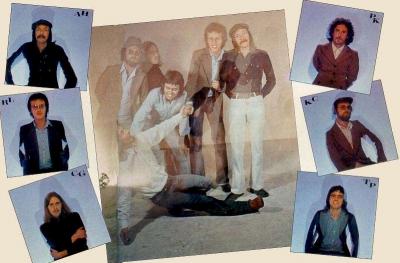


 Apart from Alan and Jacka, I think possibly I was the only other player from the Pipedream album to go out on the road with the Mk II line-up. We added Charlie Harcourt, Tommy Duffy and Paul Nichols, from the Elcorts on drums.
Whereas of course, Ray Laidlaw had played drums on Pipedream before going off on the road with Jack the Lad - and Colin Gibson played bass on the album, but didn't join us on tour. We drafted these people into the touring band and they all turned out to be Geordies, strangely enough; but I remember Hully telling me that he originally offered the drummers job in Lindisfarne Mk II to Phil Collins, and he might well have taken it at the time because he and Genesis weren't quite so well known then - and certainly not doing the sort of business they are now. And when he turned the job down, Alan told Phil: "You'll regret this decision for the rest of your life" - very prophetic Alan!!
Apart from Alan and Jacka, I think possibly I was the only other player from the Pipedream album to go out on the road with the Mk II line-up. We added Charlie Harcourt, Tommy Duffy and Paul Nichols, from the Elcorts on drums.
Whereas of course, Ray Laidlaw had played drums on Pipedream before going off on the road with Jack the Lad - and Colin Gibson played bass on the album, but didn't join us on tour. We drafted these people into the touring band and they all turned out to be Geordies, strangely enough; but I remember Hully telling me that he originally offered the drummers job in Lindisfarne Mk II to Phil Collins, and he might well have taken it at the time because he and Genesis weren't quite so well known then - and certainly not doing the sort of business they are now. And when he turned the job down, Alan told Phil: "You'll regret this decision for the rest of your life" - very prophetic Alan!!
 I'd been doing and would I go down and meet Van - I was still expecting an audition but he just wanted to chat to me! I spent a couple of hours down at Van's house, chewing the fat about this and that and the next day I called Paul Charles and said "Look, what's happening, am I in the band or when do I go for the audition.." but he told me, no you've got the gig, the rehearsals start this afternoon! In fact we only rehearsed for about two and a half hours and then two or three days later we were touring Europe!
I'd been doing and would I go down and meet Van - I was still expecting an audition but he just wanted to chat to me! I spent a couple of hours down at Van's house, chewing the fat about this and that and the next day I called Paul Charles and said "Look, what's happening, am I in the band or when do I go for the audition.." but he told me, no you've got the gig, the rehearsals start this afternoon! In fact we only rehearsed for about two and a half hours and then two or three days later we were touring Europe! KC - Alan and I hadn't worked together for some time, which was cool, you know, we all have absences and I knew that we would get back together at some point. The band went over to play in Russia and about two weeks after they got back Alan called me up and said "I've written this lyric" He couldn't wait to tell me all about his experiences over there, he loved it - apart from the fact that he couldn't get a drink on the aeroplane! - and he said to me "I've written this lyric, but the tune I've got for it is crap." So he sent me the lyric, this was 'Mother Russia' by the way, and I wrote a new tune for it, made a new demo of it with my vocal, sent it back within a couple of days and he loved it. Alan came down to my place and put his vocal on to a new demo and the collaboration went on from there, another new start in our ongoing friendship. I ended up co-writing three songs on the album, 'Demons', 'Mother Russia' and 'Spoken Like A Man'.
KC - Alan and I hadn't worked together for some time, which was cool, you know, we all have absences and I knew that we would get back together at some point. The band went over to play in Russia and about two weeks after they got back Alan called me up and said "I've written this lyric" He couldn't wait to tell me all about his experiences over there, he loved it - apart from the fact that he couldn't get a drink on the aeroplane! - and he said to me "I've written this lyric, but the tune I've got for it is crap." So he sent me the lyric, this was 'Mother Russia' by the way, and I wrote a new tune for it, made a new demo of it with my vocal, sent it back within a couple of days and he loved it. Alan came down to my place and put his vocal on to a new demo and the collaboration went on from there, another new start in our ongoing friendship. I ended up co-writing three songs on the album, 'Demons', 'Mother Russia' and 'Spoken Like A Man'. 